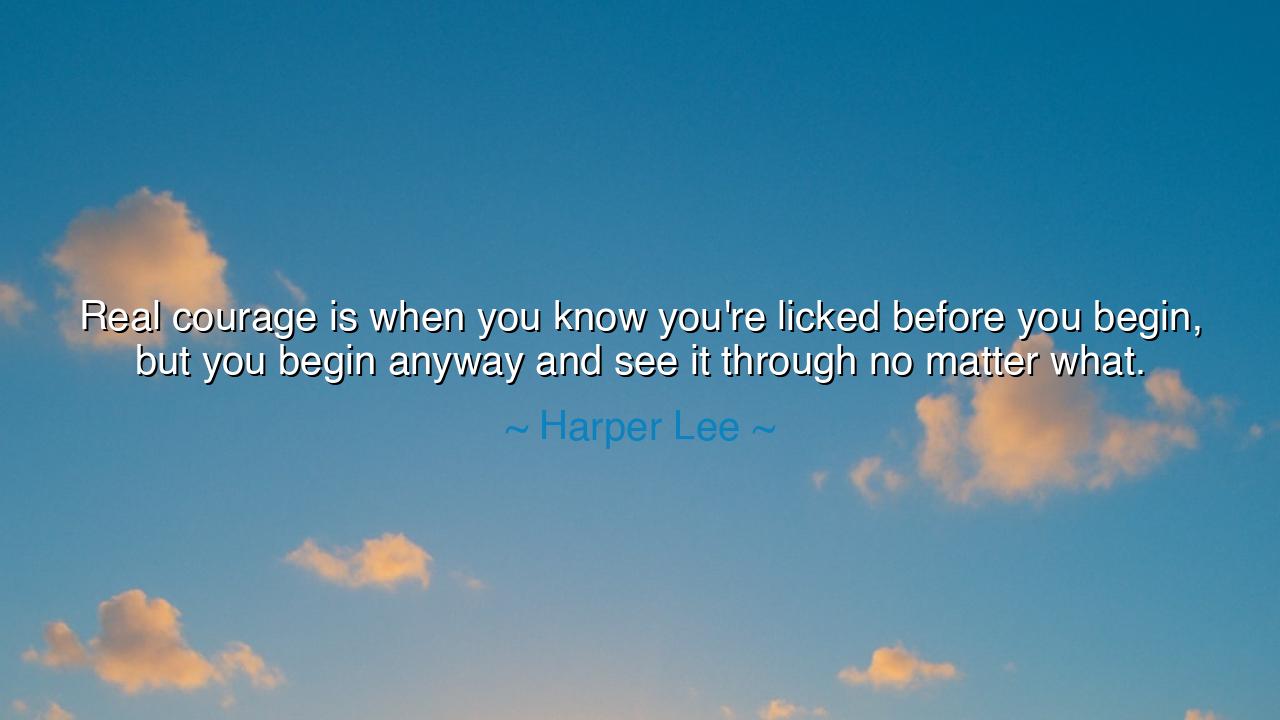
Real courage is when you know you're licked before you begin, but
Real courage is when you know you're licked before you begin, but you begin anyway and see it through no matter what.






“Real courage is when you know you’re licked before you begin, but you begin anyway and see it through no matter what.” Thus spoke Harper Lee, through the lips of Atticus Finch — her immortal voice of integrity and moral grace. In these words lies not the glory of victory, but the sanctity of endurance. She teaches that true courage is not the absence of defeat, but the refusal to surrender one’s spirit in its face. It is the strength to rise knowing the storm cannot be conquered, and yet to walk into it with head unbowed.
In the wisdom of the ancients, courage was not merely a warrior’s virtue — it was the highest test of the soul. The heroes of old were measured not by their triumphs, but by their steadfastness when all hope was stripped away. To act only when victory is certain is no act of valor; it is calculation. But to act when the heart whispers, “You cannot win,” and still to press forward — that is the courage of saints and martyrs, of those who bear light into a world of shadow. Harper Lee’s words echo that timeless creed: that the nobility of a person lies not in the result, but in the resolve.
Behold the tale of Socrates, the wise philosopher of Athens. When accused unjustly and condemned to death, he was given a chance to flee — to save his life at the cost of his principles. Yet he chose to stay, to drink the poison hemlock, and to die in peace with his conscience. He knew the verdict was unjust, the fight unwinnable. But he stood for truth, even when the world declared him “licked.” And though his body perished, his courage made him immortal. From his defeat sprang a victory that time itself could not undo — the triumph of wisdom over tyranny, of integrity over fear.
So too does Harper Lee, through her story of To Kill a Mockingbird, show us the quiet heroism of one who stands alone against injustice. Atticus Finch defends an innocent man in a court already blinded by prejudice. He knows the verdict before the trial begins; he knows the weight of hatred that will fall upon him and his children. Yet he does not turn away. He begins anyway — not to win, but because it is right. Such courage does not roar; it speaks softly, stands firmly, and endures silently. It is the courage of those who plant seeds knowing they will not live to see them bloom.
In our own age, courage often wears false masks — loud boasts, easy victories, or the applause of crowds. But the truest kind of courage, as Lee reminds us, dwells in quiet hearts. It is the mother who rises each day to care for her child through illness, the worker who labors in obscurity for the good of others, the soul who speaks truth when the world demands silence. They may stand alone, and the world may call them defeated, but in their steadfastness they reveal the divine spark that no loss can extinguish.
Real courage, then, is the meeting of despair with dignity. It is the decision to act rightly, even when wrong will prevail. The ancients would call this the virtue of the steadfast heart — the soul that holds its course when the winds of fate howl and the horizon darkens. For such courage transforms failure into honor, and mortality into meaning. Those who live by it may not always win, but they never truly lose.
Let this, then, be your inheritance from the wisdom of Harper Lee: when you face a battle that seems already lost — a dream that falters, a cause no one else will defend — begin anyway. Do what must be done, not because you will win, but because it is right. The world may strike you down, but your spirit will rise unbroken. For courage is not proved by victory, but by the will to see it through, no matter what.
And so remember this as a commandment of the soul: To act bravely even in the shadow of defeat is to walk the path of the eternal. For the gods themselves favor not the triumphant, but the unyielding — those who, though “licked before they begin,” still take up the fight, and in doing so, become timeless.






AAdministratorAdministrator
Welcome, honored guests. Please leave a comment, we will respond soon